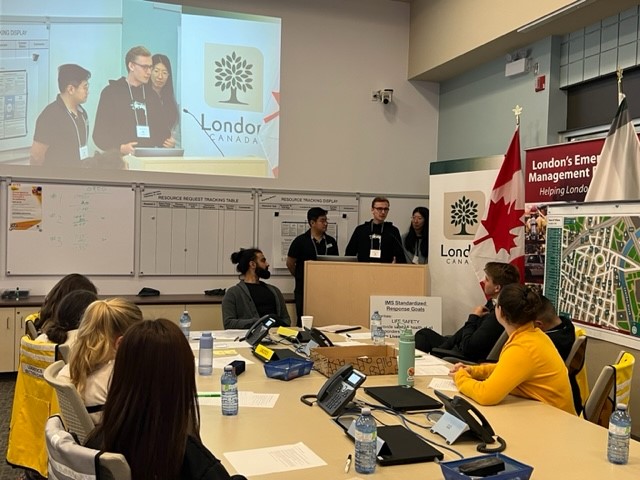Business leaders aren’t typically tasked with saving lives, declaring a state of emergency, and dealing with a swarm of media, but putting business students through such scenarios is good preparation for the grand challenges that might lie ahead.
For this year’s CEMS Block Seminar, Ivey’s visiting MSc CEMS exchange students participated in a mock emergency response exercise at the Boler Emergency Response Centre to teach them the importance of planning and purpose. The Block Seminar is an annual introductory hands-on learning event for Master of Science in Management (MSc) students from all over the world who are currently studying at Ivey through the CEMS Masters in International Management (MIM) program. This year’s seminar tied into the 2023 Estoril Conferences theme, Re-humanize Our World, which emphasized that people come first amidst challenges.
Working in groups, the students took on roles as leaders of a small town undergoing major flooding and had to determine how to save the town’s people, animals, and infrastructure all while minimizing the environmental impact. They even had to participate in a mock press conference to practice handling crisis communications.
A focus on community
The activity is used in training local emergency responders and was led by Henry Klausnitzer, Manager, Emergency Management, and Andre Luc Beauregard, Manager II, Emergency Management, both with the City of London.
“It’s a great learning opportunity and gets them out of their comfort zone. They have to think outside of the box and see a different perspective – taking care of the community,” said Klausnitzer.
Konrad Winterhager, who is visiting Ivey from the Nova School of Business and Economics in Carcavelos, Portugal, called it a “tough experience,” but one that gave him a glimpse of the many considerations and stakeholders at play when leaders are making decisions.
“When we were tested, we had to stop and reflect on what’s important and prioritize what we care about,” he said. “It shows us that leaders can find their purpose in testing moments.”
The activity was part of a full week of guest speakers and outings focused on teaching the students that, to lead with purpose, they need to be mindful of how they promote inclusive societies and interact with a wide range of stakeholders. In addition to the Boler Emergency Response Centre, the students visited the Communitech facility in Waterloo, the Linamar iHub in Guelph, the Deloitte Greenhouse and Soulpepper Theatre in Toronto, and the Goodwill Outlet and Donation Centre in London, Ontario. They also heard from three guest speakers who discussed personal and professional challenges that changed their approach to life.
Prepare to pivot and adapt
“Life happens and it’s the way that you approach it that matters,” said Kanina Blanchard, PhD '20 (Western) assistant professor of management communication and general management and Ivey Academic Director, CEMS Alliance. Blanchard taught the course along with Mazi Raz, MBA ’05, PhD ’14, an assistant professor of strategy.
“Things will happen that will complicate your work – things that you will have no control of – and you have to remember your purpose and let it drive the decisions you make,” she said.
To lead with purpose means leaders can’t wait for these big moments to show up, Raz says, they need to plan for them, rehearse, and practice making tough decisions.

Konrad Winterhager (at podium and on screen) participating in a mock press conference.
Rehumanizing the business world
“The whole idea of this week rests on the notion that leaders have a choice in how they want to engage with the world and show up with stakeholders. We’re encouraging them to rehumanize their relationships with stakeholders and to no longer view their customers as just people with wallets,” he said. “You have to find a purpose that you can live with and that has an impact.”
For Shelley Tang, a student visiting from Tsinghua University in Beijing, China, the activities were much different than she was used to in other courses and taught her about the importance of seeing the big picture.
“In my earlier courses, we only discussed business problems, but when we are looking at the full environment, you have to focus on doing what matters most. It taught us how to make quick decisions,” she said.
And Vivian Meij, who is visiting from the Stockholm School of Economics in Stockholm, Sweden, said the emergency simulation in particular helped her to see how difficult it is for leaders to manage multiple stakeholders and reminded her of the recent COVID crisis.
“Some people didn’t respond well to some of the decisions made during COVID, but now I can see how difficult it is to manage so many stakeholders,” she said. “It’s encouraging to know that, as long as you have good intentions, you will be steered in the right direction.”



